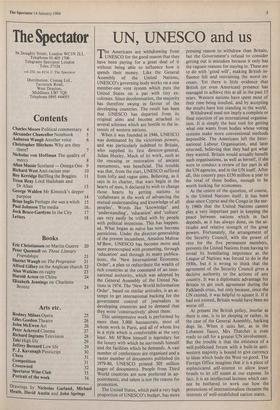UN, UNESCO and us
The Americans are withdrawing from UNESCO for the good reason that they have been paying for a great deal of it without being able to influence how it spends their money. Like the General Assembly of the United Nations, UNESCO's governing body works on a one member-one vote system which puts the United States on a par with tiny ex- colonies. Since decolonisation, the majority has therefore swung in favour of the developing countries. The result has been that UNESCO has departed from its original aims and become attached to several schemes which are hostile to the in- terests of western nations.
When it was founded in 1946, UNESCO was dominated by the victorious powers, and was particularly indebted to Britain, who supplied its first director-general, Julian Huxley. Much of its work, such as the rescuing or restoration of ancient monuments, was beneficial. The trouble was that, from the start, UNESCO suffered from lofty and vague aims. Believing, as it says in its charter, that wars begin in the hearts of men, it declared its wish to change those hearts by getting nations to `collaborate in the work of advancing the mutual understanding and knowledge of all peoples'. Words like 'knowledge' and 'understanding', 'education' and 'culture' can very easily be trifled with by people with political intentions. This has happen- ed. What began as naïve has now become pernicious. Under the director-generalship of the present incumbent, Amadou Mahtar M'Bow, UNESCO has become more and more preoccupied with promoting, through `education' and through its many publica- tions, the 'New International Economic Order', a plan to redistribute the wealth of rich countries at the command of an inter- national authority, which was adopted by the General Assembly of the United Na- tions in 1974. The 'New World Information Order', based on similar attitudes, is an at- tempt to get international backing for the government control of journalists in developing countries and to demand that they write 'constructively' about them.
This unimpressive work is performed by more than 3,000 bureaucrats, most of whom work in Paris, and all of whom live in a style which is comfortable at the very least. Mr M'Bow himself is legendary for the luxury with which he surrounds himself and the facilities which he demands. A vast number of conferences are organised and a vaster number of documents published (in 1979-80, UNESCO printed 305 million pages of documents). People from Third World countries are now preferred in ap- pointments, and talent is not the reason for promotion.
The United States, which paid a very high proportion of UNESCO's budget, has more pressing reason to withdraw than Britain, but the Government's refusal to consider getting out is mistaken because it only has the vaguest reasons for staying in. These are to do with 'good will', making British in- fluence felt and restraining the worst ex- cesses. Yet there is little evidence that British (or even American) presence has managed to achieve this at all in the past 15 years. Western nations have spent most of their time being insulted, and by accepting the insults have lost standing in the world.
Withdrawal need not imply a complete or final rejection of an international organisa- tion. It is simply the best tool for getting what one wants from bodies whose voting systems make more conventional methods impossible. The Americans left the Inter- national Labour Organisation, and later returned, believing that they had got what they wanted. Britain would actually benefit such organisations, as well as herself, if she were to conduct a review of her part in all the UN agencies, and in the UN itself. After all, this country pays £150 million a year to the total of these bodies, enough to be worth looking for economies.
At the centre of the question, of course, is the United Nations itself. It has been clear since Cyprus and the Congo in the ear- ly 1960s that the United Nations cannot play a very important part in keeping the peace between nations which in fact depends, as it has always done, on the at- titudes and relative strength of the great powers. Fortunately, the arrangement Of the Security Council, with the power of veto for the five permanent members, prevents the United Nations from having to reveal its humiliating impotence as the League of Nations was forced to do in the 1930s, but it is wrong to think that the agreement of the Security Council gives a decisive authority to the actions of any country. It was a diplomatic advantage for Britain to get such agreement during the Falklands crisis, but only because, since the UN existed, it was helpful to square it. If it had not existed, Britain would have been no worse off.
At present the British policy, insofar as there is one, is to let sleeping or rather, in the case of the General Assembly, barking dogs lie. When it suits her, as in the Lebanese fiasco, Mrs Thatcher is even ready to call for a greater UN involvement. But the trouble is that the existence of a well-publicised forum with a built-in anti- western majority is bound to give currency to ideas which bode the West no good. The Foreign Office imagines that it is a piece of sophisticated self-interest to allow lesser breeds to let off steam at our expense. In fact, it is an intellectual laziness which can- not be bothered to work out how the pretensions of internationalism threaten the interests of well-established nation states.






































 Previous page
Previous page